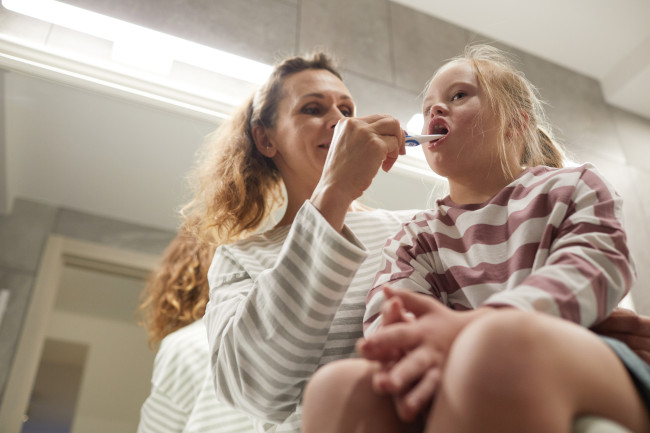For special needs patients in dental treatment, individualized care and attention must be provided for them to receive better treatment. Dental visits may be frightening or daunting due to sensory difficulties, communication difficulties, or health difficulties. This is why an easy, safe, and compassionate setting of care matters in this part of dental treatment. If you are looking for dentistry for special needs people near you, it is beneficial to know what to expect and how dental teams can best support your needs.
In this blog, we will take a look at how a dental team supports patients with special needs in feeling at ease and cared for, from consideration of communication styles to modified clinic arrangements and pacing through appointments.
Why Is A Comfort-First Approach So Important in Special Needs Dentistry?
- Patients with physical, developmental, or behavioural conditions may find dental environments difficult to navigate.
- Heightened anxiety or stress can occur through loud sounds, bright lights, and unnoticed routine procedures.
- By addressing fear and utilizing a gentle, patient-first approach to treatment, patients start to build trust with medical support over time.
- Along with discussing the use of calming approaches and adapting treatment plans, patients were more able to have successful and positive appointments with a dentist in Markham or a caring and considerate dental provider.
How Can a Dental Clinic Prepare for Emergencies Involving Special Needs Patients?
- Dental emergencies can be especially stressful for those with special needs, as sudden pain or injury may cause confusion or panic.
- Teams trained in emergency dentistry in Markham often take extra time to calm and explain the situation in a way that the patient can understand.
- Emergency visits may include pain management, careful assessment, and modified procedures based on the patient’s needs and comfort level.
- Emergency care is more effective when dental teams already know the patient’s background and preferences.
What Are the Key Features of a Sensory-Friendly Dental Clinic?
- A sensory-friendly dental clinic accommodations mean lowering sound, dimming lights, and minimizing strong smells or visual distractions.
- These changes help individuals with sensory sensitivities feel less overwhelmed during their visit.
- Some clinics offer noise-cancelling headphones, weighted blankets, or quiet rooms where patients can relax before their appointment.
- Parents or caregivers are encouraged to bring familiar items from home to provide extra comfort.
How Do Dentists Communicate with Patients Who Have Special Needs?
- Effective communication tips for special needs patients include using simple words, visual aids, and calm tones.
- Showing tools and explaining what they’re for can ease anxiety and help build understanding.
- Dentists may ask yes-or-no questions, use hand signals, or allow patients to bring a communication device.
- Including caregivers in conversations helps ensure the patient’s needs are shared and respected.
- If you’re searching for a Markham dentist near you, look for someone who values communication and patient input.
What Can Dentists Do to Make Dental Visits Less Stressful Over Time?
- Using gradual dental visit pacing techniques means breaking down the appointment into smaller, manageable steps.
- Patients may visit the clinic just to sit in the chair or take a short tour before any procedures happen.
- Each visit builds on the last, allowing the patient to gain confidence in the environment and team.
- This pacing gives patients time to get used to tools, routines, and people at their speed.
What Role Does Sedation Play in Dental Visits for People with Special Needs?
- Sedation support for special needs dentistry may be recommended when anxiety or health issues make it difficult to complete treatment safely.
- Options like nitrous oxide or oral sedation help the patient relax and allow the dentist to work more comfortably.
- Sedation dentistry is used only when necessary and always to protect the patient’s well-being.
- It’s important to have a detailed conversation with the dentist before any sedation to understand the risks and benefits.
How Can Autism-Friendly Practices Make a Difference?
- An autism-friendly dental appointment experience includes preparing the patient in advance with pictures, routines, and calm communication.
- Many practices offer visual schedules or social stories to help the patient know what to expect step-by-step.
- Dental teams are often trained to recognize signs of stress and adjust their approach to meet the individual where they are.
- These thoughtful touches make dental care more accessible and less frightening for patients with autism or similar conditions.
- They may also schedule appointments during quieter hours to reduce sensory overload.
- Consistent routines and familiar faces at each visit help build trust over time.
- Caregivers are encouraged to share tips and preferences that can help create a smoother, more personalized visit.
Discover Comfortable Care at Markville Dental
If you’re looking for care tailored to individuals with special needs, Markville Dental is proud to offer gentle support in a welcoming and understanding environment. Our team works closely with patients, families, and caregivers to create personalized dental experiences that reduce stress and build trust.
Whether your loved one needs extra time, special tools, or thoughtful communication, we’re here to support every step of the journey. From first-time visits to urgent needs, we help create a calm and positive space for everyone, no matter their abilities. Book your visit today and let us help make dental care a safe, smooth, and comfortable part of your life.








